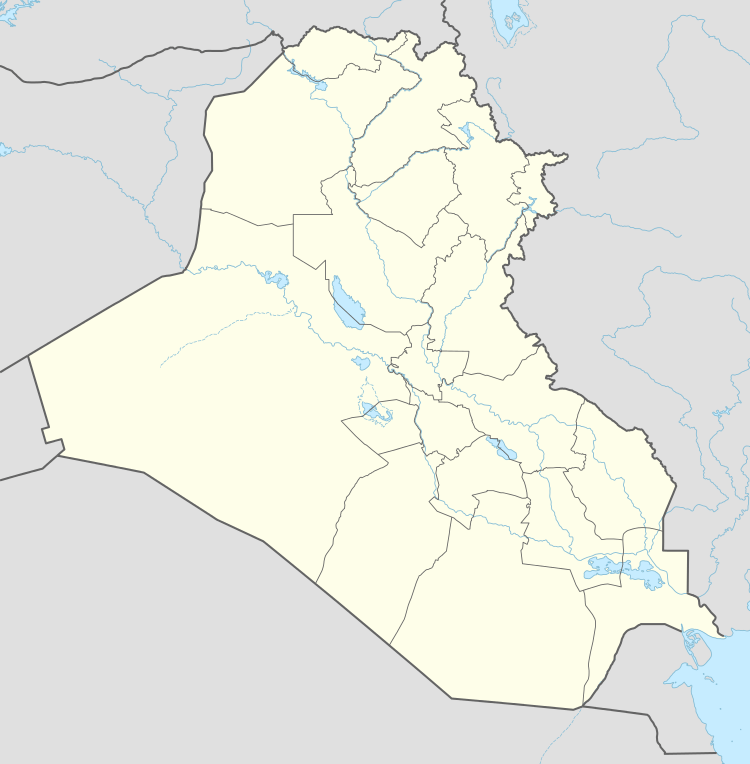West Qurna Field
West Qurna (Arabic: غرب قرنة) is one of Iraq's largest oil fields, located north of Rumaila field, west of Basra. West Qurna is believed to hold 43 billion barrels (6.8×109 m3) of recoverable reserves.[1] The field was closed to Western firms due to years-long sanctions.[2]
| West Qurna | |
|---|---|
 | |
| Country | Iraq |
| Offshore/onshore | onshore |
| Coordinates | 30°53′7″N 47°17′27″E |
| Owner | Iraq National Oil Company |
| Service contractors | Exxon Mobil, Royal Dutch Shell, Lukoil, Statoil |
| Field history | |
| Discovery | 1973 |
| Production | |
| Recoverable oil | 43,000 million barrels (~5.9×109 t) |
Phases
West Qurna Phase I
In November 2009, an Exxon Mobil - Shell joint venture won a $50 billion contract to develop the 9-billion-barrels (1.4×109 m3) West Qurna Phase I.[1] As per Iraqi Oil Ministry estimates, the project will require a $25 billion investment and another $25 billion in operating fees creating approximately 100,000 jobs in the underdeveloped southern region. ExxonMobil is set to increase the current production of 0.27 to 2.25 million barrels per day (43×103 to 358×103 m3/d) within seven years. The Iraqi government, in turn, will pay $1.90 per barrel produced by ExxonMobil-Shell alliance.[3]
West Qurna Phase II
In December 2009, Russia's Lukoil and Norway's Statoil were awarded the rights to develop the 12.88-billion-barrels (2.048×109 m3) West Qurna Phase II oil field. The Lukoil-Statoil alliance will receive $1.15 per barrel that they produce. In addition, they will work to raise output from West Qurna 2 to 120,000 barrels per day (19,000 m3/d) by 2012[4] and 1.8 million barrels per day (290,000 m3/d) over a period of 13 years.[5][6] In March 2012, Statoil sold its 18.75% stake in the field to Lukoil, giving the Russian firm a 75% stake, and leaving the Iraqi state oil company with 25%.[7]
Water-injection project
A new joint multibillion-dollar water-injection project will be awarded to operator ExxonMobil. The project includes construction of a plant which will help 6 major oil-field development projects by producing 10–12 million barrels (1,600,000–1,900,000 m3) of water per day. The alliance will include Shell, Eni SpA, Lukoil, CNPC and Petronas.[8]
See also
References
- Christopher Helman (2010-01-21). "The World's Biggest Oil Reserves". Forbes. Retrieved 2010-04-19.
- Gina Chon (2009-11-05). "Iraq Awards West Qurna-1 Oil Field to Exxon, Shell". The Wall Street Journal. Retrieved 2010-04-19.
- Martin Chulov (2009-11-05). "ExxonMobil wins $50bn contract to develop West Qurna oilfield". Guardian. Retrieved 2010-04-19.
- Simon Webb (2010-04-27). "Iraq's West Qurna to hit 120,000 bpd in 2012". Reuters. Retrieved 2010-05-21.
- "Russian Oil Giant Wins Big in Iraq Auction". Fox News. 2009-12-12. Retrieved 2010-04-19.
- "Iraq sets West Qurna date". Upstream Online. NHST Media Group. 2010-01-20. Retrieved 2010-04-19.
- "Iraq approves Statoil sale of oil field stake to Lukoil". af.reuters.com. Retrieved 2012-03-07.
- Hassan Hafidh (2010-04-19). "Exxon Spearheads Iraqi Water-Injection Project". Rigzone. Retrieved 2010-04-19.